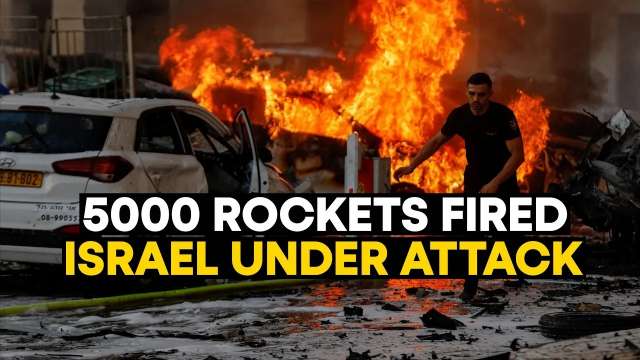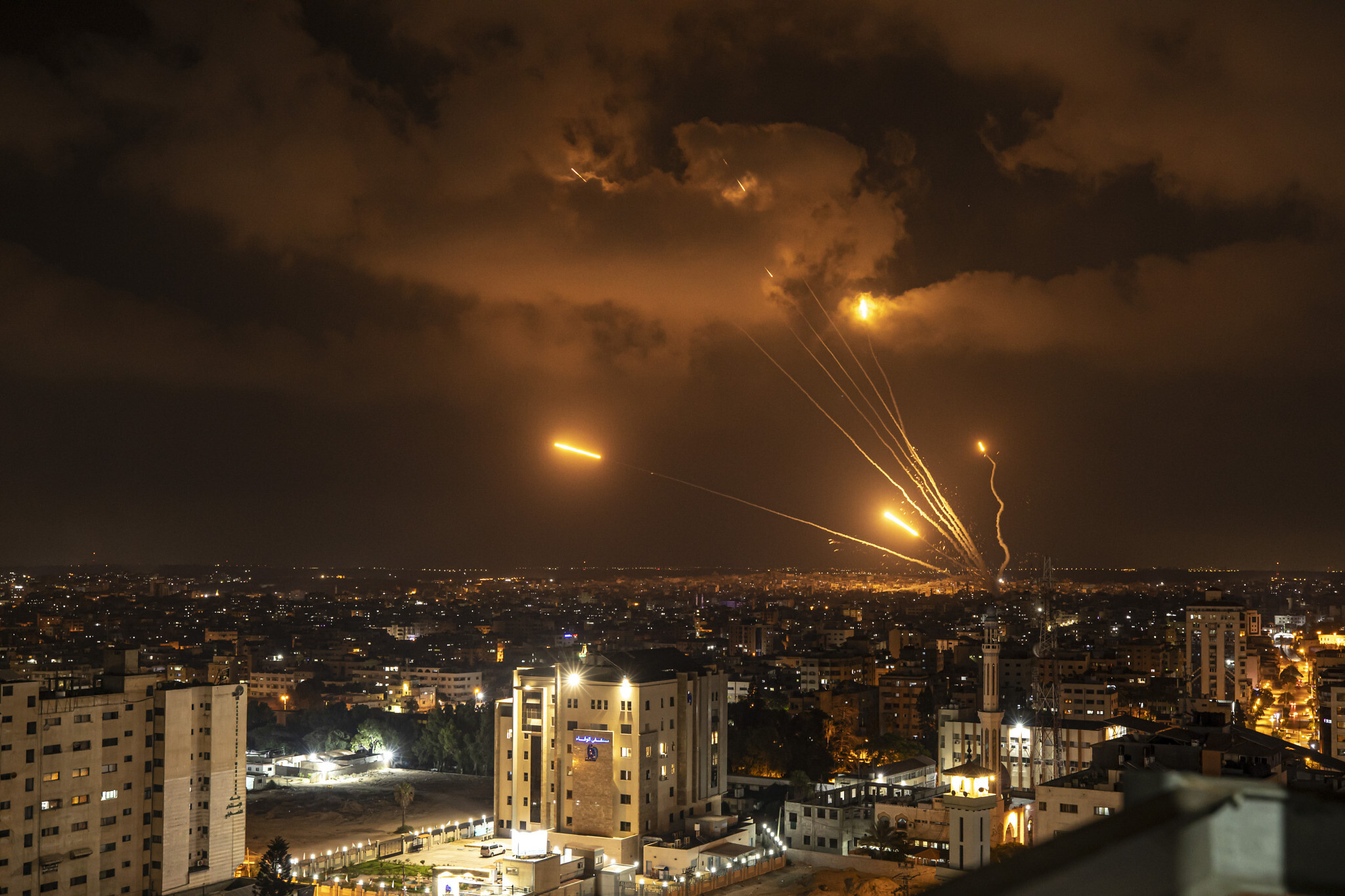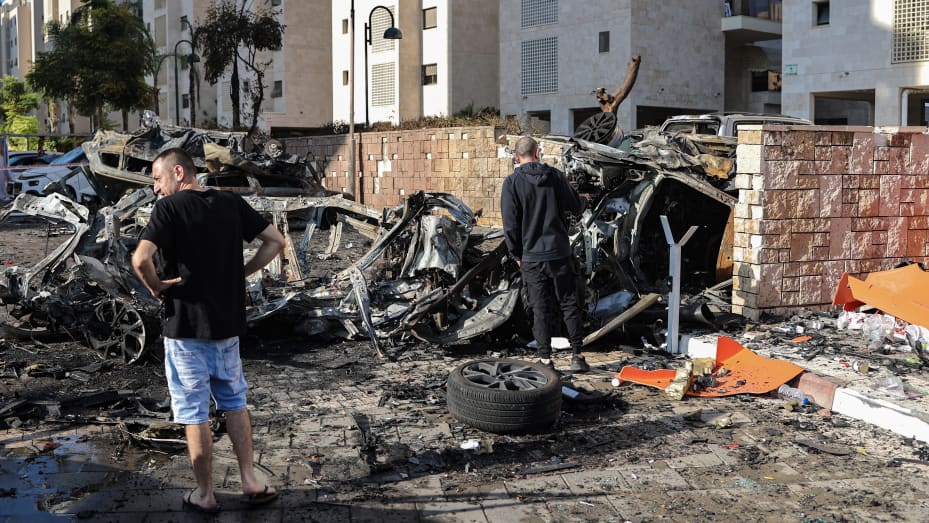Israel has declared a state of war following a surprise attack by Gaza militants on Saturday morning.
The deadly attack involved firing thousands of rockets and infiltrating Israel through various means, including land, sea, and air, using paragliders.
Prime Minister Benjamin Netanyahu expressed that the nation is in a state of war, and the conflict has resulted in a significant loss of life and numerous injuries in Israel; throughout the day, fighting continued, with fresh rocket attacks targeting areas such as Tel Aviv in the evening.
Efraim Halevy, the former chief of Mossad, Israel’s Intelligence Service, revealed that the outbreak of war was a total surprise, with no prior warning.
He noted that Hamas launched over 3,000 rockets in less than 24 hours, a quantity and effectiveness that Israel did not anticipate; he described the attack as highly successful and well-coordinated, highlighting the unique nature of the assault, which allowed Gaza to penetrate deep into Israel and seize control of villages.
He speculated that the rockets were manufactured in Gaza and smuggled in by sea, while Hamas likely conducted trial training without detection by Israeli forces. The element of surprise caught Israel off guard.

Hamas Unprecedented Attack On Israel
Israel responded with airstrikes while engaging in ground clashes with Hamas fighters. Hamas claims to have captured dozens of Israelis, including soldiers, and authenticated videos depict some of these dramatic captures, which the Israeli military has acknowledged.
In a statement, Hamas revealed that the Israeli hostages they had taken are being held across the Gaza Strip and, warned against attacks in the area and cautioned Israel about miscalculations.
Hamas had earlier claimed to have captured “dozens” of Israelis during Saturday’s surprise attack; videos released by Hamas provide insights into how Gaza militants overtook an Israeli military base just outside Nahal Oz, Israel.
These videos show dozens of militants, armed with guns, grenades, and bomb-dropping drones, successfully executing the attack; at least two Israeli soldiers were killed, and six female soldiers were seen being taken prisoner in the videos.
A distressing video shows an unconscious woman, identified as Shani Louk, a German-Israeli dual national, being held hostage by Gaza militants who attacked an Israeli music festival.
The video shows her being paraded around the area, with one gunman having a rocket-propelled grenade draped over her waist, while another holds her dreadlocks.
The crowd joins in cheers of “Allahu Akbar” (“God is Great” in Arabic), and one individual even spits on Louk’s head as the car drives off; her condition and whereabouts remain unknown. Louk’s mother made a plea for help, expressing concern about her daughter’s situation.
The German government is in contact with Israeli authorities to determine the extent to which German citizens have been affected by the conflict.
The death toll in Israel has risen to at least 300 following Saturday’s attacks, as reported by an Israeli official; over 1,500 others have been injured, and fighting has continued throughout the day, with fresh rocket attacks hitting Tel Aviv and other areas in the evening.

Israel’s Response
Israeli security forces successfully regained control of the Sderot police station after a group of armed “terrorists” had infiltrated it; about ten of these individuals were neutralised after a determined effort by the police and the Israel Defense Forces.
Israel’s political-security cabinet convened to determine the country’s response to the Hamas attack; the cabinet made operational decisions aimed at destroying the military and governmental capabilities of Hamas and the Palestinian Authority.
Prime Minister Netanyahu characterised the situation as a long and difficult war initiated by a murderous attack by Hamas.
The first phase of the operation involved the destruction of most enemy forces that entered Israeli territory; Israel’s objective was to nullify Hamas’s ability to threaten its citizens and restore security to the nation. Among the measures taken by the cabinet is the cessation of the supply of electricity, fuel, and goods to the affected areas.
The Israel Defense Forces (IDF) have outlined an aggressive response plan against Hamas; IDF spokesman Lt. Col. Jonathan Conricus revealed that possibly up to 1,000 Hamas fighters were involved in the attacks.
Israeli naval forces successfully thwarted a potential attack at Zikim Beach in southern Israel, according to a statement from the Israel Defense Forces (IDF); Zikim Beach is located near Gaza’s northern border with Israel.
The IDF detected seven terrorists in the area and took action to prevent their infiltration into residential areas; Israeli fighter jets also targeted operational command centers used by Hamas to carry out attacks against Israel from the Gaza Strip.
The IDF has urged civilians in Gaza to evacuate their residential areas immediately due to ongoing military operations targeting Hamas following the surprise attacks on Saturday.
The IDF is currently fighting to restore sovereignty and order in Israel by dawn and intends to secure the border and intensify efforts against Hamas.

Global Response
US aviation authorities have issued a special bulletin to pilots and airlines operating near Tel Aviv, urging “extreme caution” due to the ongoing conflict between Israel and Gaza; the FAA advises flight crews to remain in contact with air traffic control and be prepared for potential airspace closures.
Pakistan’s Caretaker Prime Minister Anwaar-ul-Haq Kakar expressed condolences for the victims and families affected by the surprise attack on Israel by Gaza militants.
In a tweet, he lamented the escalating violence in the Middle East and stressed the urgent need to address the Palestine Question; he urged restraint and emphasised that lasting peace in the Middle East hinges on a two-state solution.
Meanwhile, India’s Prime Minister Narendra Modi also extended condolences for the terrorist attacks in Israel; he expressed solidarity with Israel during this challenging time and conveyed thoughts and prayers for the innocent victims and their families.
At the same time, the Indian Embassy in Israel issued an advisory to its citizens, urging them to remain vigilant and follow local safety guidelines.

US Military Help And Involvement Of Iran
The US Defense Secretary Lloyd Austin called military officials to ensure the Defense Department can support Israel’s defence efforts.
Austin reiterated the United States’ unwavering commitment to Israel’s right to self-defence and offered condolences to the families of those affected by the attacks.
A senior US administration official stated that it is “too early” to determine if Iran was directly involved in the attack on Israel but emphasised that the US will closely investigate the matter.
The official reiterated that Hamas is funded, equipped, and armed by Iran and affirmed the US commitment to holding Iran accountable and that the billions of dollars unfrozen for Iran earlier this year are not linked to the attack on Israel and can only be spent for humanitarian purposes.
The US is considering announcing new assistance to Israel as early as Sunday to support its response to the Hamas attack; however, the current dysfunction in Congress, with no sitting House Speaker, presents challenges in coordinating assistance efforts.
American and Israeli officials are discussing Israel’s specific needs in the wake of the attack; President Biden has assured Israel of US support to defend itself, though specifics regarding weapons or hardware have not been disclosed, and discussions with Israel about providing assistance, and further details may be announced soon.
While it is premature to speculate on the attack’s impact on the prospects of a normalisation agreement between Israel and Saudi Arabia, the official stated that terrorist groups like Hamas will not derail such efforts. The US continues to share timely intelligence about regional threats with its partners, including Israel.

Why Israel’s Advanced Border Security Couldn’t Prevent Saturday’s Attack?
Israel’s advanced border security systems couldn’t thwart Saturday’s attack, which saw assailants infiltrate from air, sea, and land, targeting civilians, taking hostages, and forcing families to seek refuge indoors in fear for their lives.
The day commenced with blaring air raid sirens, but by midday, it had transformed into one of Israel’s most horrifying attacks in its 75-year history.
The assailants, linked to Hamas, the Islamist militant group controlling the densely populated Gaza Strip, had by nightfall inflicted hundreds of casualties.
While Israel has experienced terrorism before, Saturday’s attack was unprecedented, primarily due to the element of surprise despite Israel’s stature as a technological powerhouse with a premier intelligence agency, its military found itself unprepared.

Many Questions for Israeli Authorities
It has been over 17 years since an Israeli soldier was taken as a prisoner of war during an assault on Israeli territory; not since the town-by-town fighting in the 1948 War of Independence has Israel witnessed such an infiltration of military bases, towns, and kibbutzim.
The puzzling question is how a terror group from one of the world’s poorest areas managed to execute such a devastating attack.
System Failure
Jonathan Conricus, a former international spokesperson for the Israel Defense Forces, referred to the incident as a comprehensive system failure, encompassing various components of Israel’s defence architecture that evidently couldn’t safeguard its civilians.
Since Israel’s withdrawal from Gaza in 2005, the country has invested billions in securing its borders, including intercepting weapons fired from Gaza, preventing air and underground border crossings, and deploying the Iron Dome missile defence system, developed with US assistance. Additionally, Israel spent hundreds of millions on a smart border system with sensors and subterranean walls, completed in 2021.
Lack of Information
Israeli authorities have yet to release detailed information about the effectiveness of their security measures, such as the number of intercepted rockets or the performance of the border fence.
Questions about whether this constitutes an intelligence failure remain unanswered, as the focus is currently on protecting civilian lives.
Why the al-Aqsa Mosque Remains a Persistent Flashpoint of Tensions?
The al-Aqsa compound, known as Al Haram Al Sharif (Noble Sanctuary) in Islam and Temple Mount in Judaism, stands as one of the most revered sites for both religions; however, over decades, it has been a continual source of tension between Israel and the Palestinians.
In a recent statement, Hamas claimed responsibility for the “Al-Aqsa Storm” attack launched on Israel, citing the defence of this holy site as one of its motivations.
A Delicate Status Quo
According to an arrangement reached over a century ago, only Muslims are permitted to pray within the compound; non-Muslim visitors are granted access during specified times and are restricted to certain areas within the complex.
Erosion of Sole Worship Rights
Concerns have arisen in the Muslim world, where many fear that the exclusive right to worship at the site has diminished. Additionally, there is apprehension that the holy sites themselves are under threat due to the presence of a growing far-right Jewish movement and the policies of Israel’s far-right government.
Frequent Clashes
The al-Aqsa compound has witnessed recurrent clashes between Palestinian worshipers and Israeli security forces; in the past year, police have conducted several raids on the site.
Complex Location
The compound is situated in East Jerusalem, an area the Palestinians envision as the capital of their future state, while the international community largely regards it as occupied territory.
Israel gained control of East Jerusalem during the six-day war in 1967 and considers both East and West Jerusalem as its unified, “eternal capital.”
The al-Aqsa Mosque’s significance in the context of religion, politics, and territorial disputes has rendered it a focal point of tension, contributing to the ongoing conflict between Israel and the Palestinians.
The Last Bit, As Israel grapples with the aftermath of the unprecedented attacks by Hamas, the nation’s leaders, led by Prime Minister Benjamin Netanyahu, have vowed to respond with force and determination.
The international community, notably the United States, has pledged its support for Israel’s right to defend itself against these acts of terrorism.
While the situation remains highly volatile, with a significant number of hostages in the hands of Hamas, it is evident that Israel is resolved to bring those responsible to justice and ensure the safety of its citizens.
The events will undoubtedly shape the future of Israel’s relations with its neighbours and the broader Middle East.
For now, as the world watches closely, hopes for a peaceful resolution remain while the consequences of these unprecedented attacks continue to unfold.




